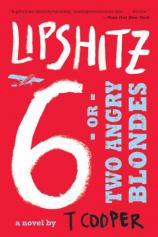Reading Group Guide
Discussion Questions
Lipshitz Six, or Two Angry Blondes

1. Of Esther Lipshitz, a A New York Times reviewer has written, "Not since Sophie Portnoy has there been a Jewish mother from quite the same place in hell." Do you agree or disagree? Is Esther a good mother, a bad mother, or somewhere in between? What is the stereotype of the typical "Jewish mother," and does Esther stray from this stereotype or adhere to it?
2. Do you like the character of Esther? Why or why not? Do you think characters must be "likeable" in order for them to be compelling in stories?
3. Why do you think Esther clings to the image of Charles Lindbergh when she reads about him in the newspaper after his 1927 flight? What might Lindbergh represent to an immigrant woman like Esther, and why would she want to claim him as her lost son? How does Lindbergh represent America to the rest of the world?
4. How would you respond to losing your child and never learning what really happened to him or her? Are there any unresolved mysteries from your family history that will remain forever unanswered?
5. What role does faith play in the Lipshitz lineage? The Jewish religion seems to diminish throughout the generations. Why do you think this happens?
6. Many characters in the novel experience a change of identity—some more radical than others. What are some of the specific changes in identity that Esther, Avi, Ben, Miriam, and T experience? What about Lindbergh, especially during the years leading up to World War II?
7. What do you think about the change in point of view in the second part of the book? What about the insertion of newspaper articles, telegrams, letters, and photographs throughout the narrative? Why do you think the author chose to structure the novel in this way? How might the novel have been different if it had maintained the same point of view throughout, or did not include these meta-textual elements?
8. How do the effects of violence, persecution, loneliness, and loss get passed down or repeated throughout the four generations of Lipshitzes?
9. Years removed from the Russian pogroms, the last living Lipshitz, T Cooper, appropriates the persona of a hip-hop artist who raps about violence, anger, and family. Why do you think T gravitates toward Eminem?
10. The author's grandmother lost a brother when their family landed at Ellis Island—much in the same way Reuven Lipshitz is lost when Hersh and Esther Lipshitz immigrate to America in Lipshitz Six, or Two Angry Blondes. There are other seemingly autobiographical "facts" sprinkled throughout the novel, including the character named T Cooper in the contemporary section of the novel. Does it change your experience of a book when you believe that parts of the story you're reading are "true"? If so, how? And if not, why not?
11. Why do you think the author T Cooper chose to give one of the protagonists of the novel the same name? Does this decision affect how you read the story? Would the experience of reading Lipshitz Six, or Two Angry Blondes be different if this character had another name?
12. How is the character T Cooper's passing as another gender similar to the immigrant experience of living within two cultures? How is it different?
13. The novel opens with the quintessential American dream of a family's coming to America in search of religious freedom and economic opportunity. Most members of the Lipshitz family, in addition to Lindbergh and Eminem, are similarly pursuing an "American dream." How has the American dream changed over the decades, especially as it is represented in Lipshitz Six, or Two Angry Blondes?
14. What do you think Lipshitz Six, or Two Angry Blondes says about fame in American society in the 20th century and on the brink of the 21st?
15. Do you think the ending of the novel is hopeful?
Lipshitz Six, or Two Angry Blondes
- Publication Date: January 30, 2007
- Paperback: 448 pages
- Publisher: Plume
- ISBN-10: 0452288061
- ISBN-13: 9780452288065







